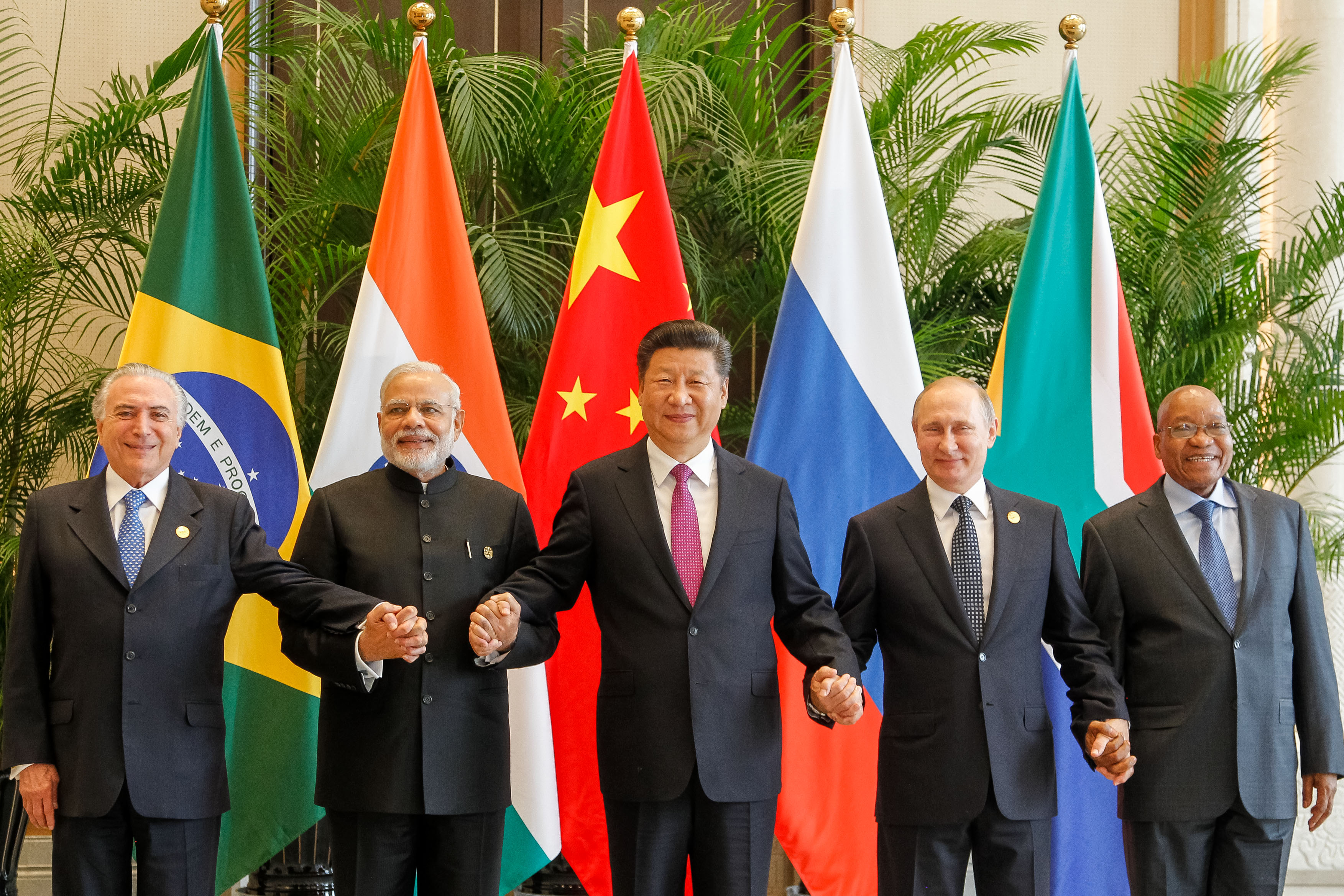
The principal members of the BRICS grouping pose for a photo at the 2018 BRICS Summit.
“Venezuela was left out of the final list of countries that aspired to be partners, at the request of Brazil…Venezuela has not commented on Brazil’s refusal to allow it to join the bloc.”
In recent years, the BRICS grouping—Brazil, Russia, India, China, and South Africa—has emerged as a major challenger to the Western-supported international order.[i] Led by major emerging market economies on five continents, BRICS has increased its influence over matters of global financial governance, reform of multilateral institutions, and support of a Global South agenda. The group has also pushed to expand its ranks and influence, with five countries from the Middle East and the Horn of Africa joining in 2023. At least three Latin American countries, Venezuela, Cuba, and Bolivia, sought entrance to the organization at the 2024 BRICS Summit, held in Kazan, Russia.[ii]
As CNN en Español notes, the regional outlet of the U.S. media company, the Maduro regime in Venezuela has pushed the hardest to gain entry. The outlet reports that Maduro traveled to Kazan, Russia, to press his country’s case and meet with Russian President Vladimir Putin and Chinese President Xi Jinping. As the Colombian digital news outlet NTN24 relays, this was Maduro’s first international trip after elections widely considered to be fraudulent and stolen in Venezuela.[iii] Maduro’s intention, the outlet states, is to establish diplomatic partnerships to reduce his international isolation and secure economic lifelines to avoid increasing sanctions. Both outlets report that Brazil vetoed Venezuela’s membership over concerns related to its election conduct in July 2024. For their parts, Bolivia and Cuba, two other autocratic regimes in Latin America, secured “partner status” on their way to membership in the BRICS.
This development signals that dictatorships in Latin America see the BRICS grouping as an economic and political lifeline amid difficult economic and diplomatic moments. Relatedly, the inclusion of a greater number of Latin American countries in BRICS will bring China and Russia further into the Western Hemisphere, where both have been increasing their influence of late.
Sources:
“Maduro se reúne con Putin durante cumbre de los BRICS en Rusia (Maduro meets Putin during BRICS summit in Russia), CNN en Español (the regional outlet of the US network), 23 October 2024. https://cnnespanol.cnn.com/2024/10/23/reunion-maduro-putin-cumbre-brics-orix
Putin, who is chairing the meeting, said he supported Venezuela’s aspiration to join the group of emerging economies. The Russian president also highlighted that both nations have several projects to cooperate in economics, politics, science and culture, among other issues. The group, which began with Russia, Brazil, China, India and South Africa, recently included Iran, Ethiopia, the United Arab Emirates and Egypt. Venezuela was left out of the final list of countries that aspired to be partners, at the request of Brazil…Venezuela has not commented on Brazil’s refusal to allow it to join the bloc.
“Maduro llega a Rusia para solicitar sumarse al BRICS en su primer viaje después de las elecciones (Maduro arrives in Russia to request to join BRICS on his first trip after the elections),” NTN24 (a Colombian digital news outlet with excellent regional coverage), 22 October 2024. https://www.ntn24.com/noticias-politica/maduro-llega-a-rusia-para-solicitar-sumarse-al-brics-en-su-primer-viaje-despues-de-las-elecciones-520339
Maduro’s visit is for the BRICS meeting, in which around twenty countries, including Venezuela, are asking to join the bloc in order to boost their economies. Maduro is traveling on the same day that marks one year since the primary elections that sparked an unprecedented citizen movement to elect the opposition candidate to face Maduro in the presidential election…One of the countries that has demanded that Maduro show the minutes and respect the will of the people [after another fraudulent election] is the president of Brazil, Luis Inacio Lula Da Silva, who is part of the BRICS and said a day earlier that he would refuse to include Venezuela in the BRICS due to what happened in the elections.
Notes:
[i] For more information about the BRICS grouping and its recent efforts at expansion, see: Mariel Ferragamo, “What is the BRICS Group and Why is it Expanding?,” Council on Foreign Relations, 18 October 2024. https://www.cfr.org/backgrounder/what-brics-group-and-why-it-expanding
[ii] For more analysis on Latin America’s dictatorships seeking entrance into the BRICS, see: Ryan C. Berg, Christopher Hernandez-Roy, Rubi Bledsoe, and Henry Ziemer, “Why Are Latin American Dictators Seeking Membership in BRICS+?,” Center for Strategic & International Studies, 28 October 2024. https://www.csis.org/analysis/why-are-latin-american-dictators-seeking-membership-brics
[iii] For more information on Venezuela’s July 2024 elections, see: Ryan C. Berg and Christopher Hernandez-Roy, “Can Maduro Pull Off the Mother of All Electoral Frauds?,” Center for Strategic & International Studies, 1 August 2024. https://www.csis.org/analysis/can-maduro-pull-mother-all-electoral-frauds
Image Information:
Image: The principal members of the BRICS grouping pose for a photo at the 2018 BRICS Summit.
Source: https://commons.wikimedia.org/wiki/File:Brics_Leaders_2016.jpg.
Attribution: CC BY 2.0
